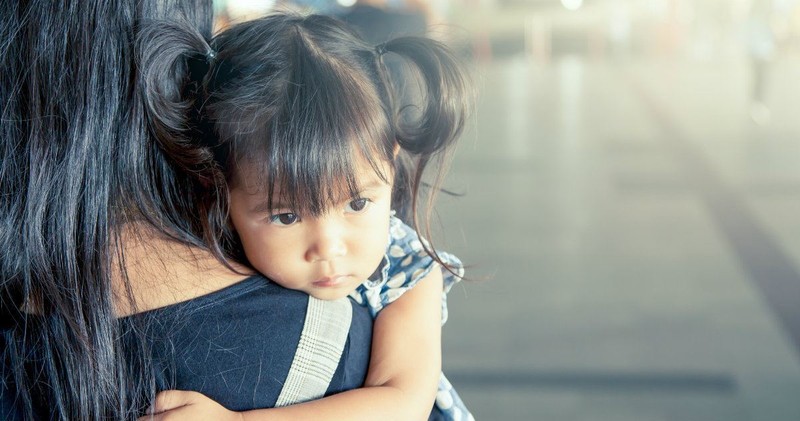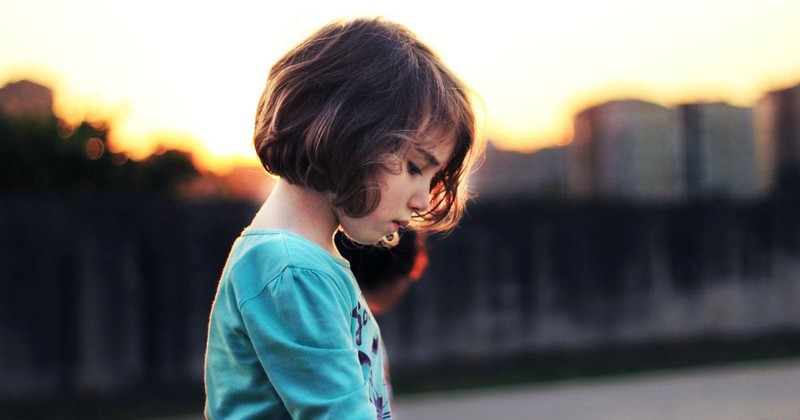
Long before the phrase Helicopter Parenting arrived on the scene, I was the model parent for this phenomenon. My poor kids could hardly move a muscle before I was checking to make sure they weren’t hurt or in desperate need of something.
I still remember the day when my oldest son, at two years of age, climbed to the top of a tall slide at the park. There he stood at the top, calling out and waving to me, while I began pushing other people’s kids out of the way to rescue him from certain death!
We laugh about it now, (25 years later), but I can’t help but see how my overprotective ways were not always good for my kids. While we need to be invested and involved in our children’s lives, we should guard against overprotecting them out of fear or an unhealthy sense of control.
Take it from me—the poster mom for every helicopter parent out there. Here are 10 signs your child might be overprotected.

1. They Are Highly Insecure
In our attempts to keep our children safe from every possible harm, we may end up raising fearful and insecure kids. Allowing them to experience a few bumps and bruises in life will toughen them up and help them move forward in courage.
As parents, it’s our job to love, nurture, train, and protect. However, it’s not our job to overprotect. Instead, let’s build their confidence in the Lord, knowing He is their ultimate protector. Let’s build their security by loving them without smothering them.
Let us then approach God’s throne of grace with confidence, so that we may receive mercy and find grace to help us in our time of need. (Hebrews 4:16)
Image Credit: Getty/sasiistock

2. They Are Afraid to Try New Things
When our kids are sheltered too much, it can stifle their sense of adventure. Instead of exploring new activities—ones that might actually be good for them—they will stick to what is safe or comfortable.
However, this doesn’t lead to a strong life of faith! In fact, fearful living may prevent our kids from answering God’s call one day. Instead of fueling fear in our children’s lives, let’s cheer them on, encourage new adventures, and stop overprotecting!
For we are God’s handiwork, created in Christ Jesus to do good works, which God prepared in advance for us to do. (Ephesians 2:10).
Image Credit: Getty

3. They Struggle to Make Decisions
When parents are in the habit of making every decision for their children, an unhealthy sense of dependency can form. This dependency can stifle their maturity and prevent them from being able to make solid decisions for life.
By training them in the Word of the Lord, we are giving them the best guide for decision making! After all, we want them to learn to trust God in all things. Instead of overprotecting our kids by deciding for them, let’s teach them to make wise decisions by listening to the Lord and following His word.
Thy word is a lamp unto my feet, and a light unto my path. (Psalm 119:105)
Image Credit: @GettyImages

4. They Avoid Making Friends
Protecting our kids from bad influences is a good thing. However, overprotecting them may lead to an inability to make or keep friends.
Kids need to connect with others and eventually be able to discern good and bad influences on their own. It’s great for us to guide them, but ultimately, they will need to learn how to choose good friends and foster healthy relationships.
Two are better than one, because they have a good return for their labor: If either of them falls down, one can help the other up. But pity anyone who falls and has no one to help them up. (Ecclesiastes 4:9-10)
Image Credit: ©GettyImages

5. They Push against Authority
Our oldest son quickly grew tired of our overprotective ways and began to lash out. For a time, it seemed like he opposed everything we did! He threw tantrums, had alarming outbursts, and fought us at every turn.
It took many years for us to realize that our hovering ways were causing him to feel stifled, which caused him to push back. We prayed hard, read trusted parenting books, and found creative ways to remain consistent without overprotecting.
If your child is acting out, it may be that you are too overprotective. Pray about it and seek wisdom from others. Try a new approach that gives your child some healthy space, without compromising your authority.
Train up a child in the way he should go, and when he is old he will not depart from it. (Proverbs 22:6)
Image Credit: @GettyImages

6. They Don’t Have Many Life Goals
Kids who are overprotected may have a sense of defeat before they even begin. If parents have dictated their child’s every move, they will struggle to identify their own goals in life.
Instead of limiting our children to fulfill our dreams for them, we should ask thoughtful questions that require them to think about their future. Let’s be encouragers instead of discouragers, even if they choose a path that is different than what we expect. Ultimately, let’s help them discover their God-given strengths and direct them towards seeking God’s will for their life.
Present your bodies as a living sacrifice, holy and acceptable to God, which is your spiritual worship. Do not be conformed to this world, but be transformed by the renewal of your mind, that by testing you may discern what is the will of God, what is good and acceptable and perfect. (Romans 12:1-2)

7. They Struggle to Receive Instruction from Others
When parents overprotect, by giving the idea that they have all the answers, it can cause real problems for our children with teachers, youth leaders, and others in authority. While it’s great to teach our kids discernment about the instruction they receive, it isn’t good to make them think that we are the only ones who are right.
Instead, let’s invite strong mentors into our children’s lives. Let’s welcome grandparents, coaches, pastors, and trusted friends. After all, they might be able to communicate something valuable to our children that we cannot.
Whoever walks with the wise becomes wise, but the companion of fools will suffer harm. (Proverbs 13:20)

8. They Lack Maturity
Overprotected kids may be so sheltered from outside influences, they will lack maturity to handle real-life issues. They may feel scared or intimidated by the big wide world around them and retreat in safety.
While we want our kids to be careful, we also want them to grow up strong and brave. They need to know about some of the issues going on in the world, and be given Biblical wisdom to handle them. Here is an article that discusses how to talk to kids about difficult subjects.
Guard your heart above all else, for it determines the course of your life. (Proverbs 4:23)

9. They Get Depressed
It’s possible that overprotecting our children can cause them to feel depressed. If our parenting feels more like oppression to them, kids might feel stifled and even trapped.
Even though they might not have the ability to articulate how they are feeling, we can watch for signs of depressionand get appropriate help when needed. Instead of oppressing them, let’s be better about building a strong relationship with them—a relationship that involves listening and encouraging.
I waited patiently for the LORD; he turned to me and heard my cry. He lifted me out of the slimy pit, out of the mud and mire; he set my feet on a rock and gave me a firm place to stand. He put a new song in my mouth, a hymn of praise to our God. Many will see and fear the LORD and put their trust in him. (Psalm 40:1-3)
Image Credit: @Pexels

10. They Are Resentful
Does your child seem to resent your every move? It could be that they feel overprotected and are pushing back in anger. Try having honest discussions about their anger and come up with creative solutions to help them manage it. By showing them you care, and are willing to work with them, they will be more likely to let go of some of the resentment they are carrying.
A soft answer turns away wrath, but a harsh word stirs up anger. (Proverbs 15:1)
I may have been one of the first helicopter parents out there, but I certainly won’t be the last. Hopefully, these 10 warning signs have helped you determine whether you’re overprotecting your child or not. If you are, don’t worry. It’s never too late to make necessary changes to nurture a healthy relationship with your kids!
Image Credit: @Getty/SinanAyhan

Jennifer Waddle considers herself a Kansas girl, married to a Colorado hunk, with a heart to encourage women everywhere. She is the author of several books, including Prayer WORRIER: Turning Every Worry into Powerful Prayer, and is a regular contributor for LifeWay, Crosswalk, Abide, and Christians Care International. Jennifer’s online ministry is EncouragementMama.com where you can find her books and sign up for her weekly post, Discouragement Doesn’t Win. She resides with her family near the foothills of the Rocky Mountains—her favorite place on earth.
Originally published Tuesday, 20 August 2019.









